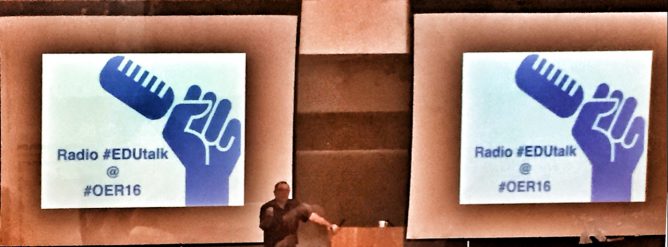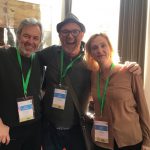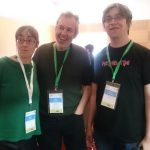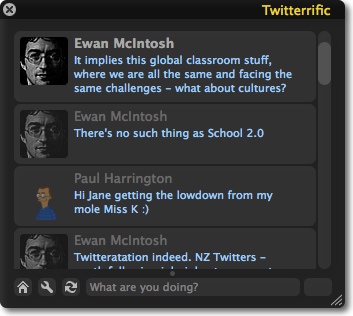Last week I took the edutalk mic to #OER16: Open Culture The 7th Open Educational Resources Conference.
The idea was to broadcast & podcast the keynote and also get some conversations between various participants.
Broadcasting the keynotes worked well. Getting folk lined up for a chat proved more of a challenge. It seems that most of the attendees wanted to be in sessions! I think this was the most engaged conference I’ve ever been at.
Lucky for me folk were happier to give up their lunch than skip a workshop and I managed to record some fascinating conversations.
I’ve cleaned up some of the recordings and posting them to oer16 | EDUtalk.
It is amazing the privilege that having a microphone gives you. You get to listen to a lot of clever stuff.
In higher education the idea of open education is now well enough established that the discussions have become quite nuanced. There are a wide range of definitions and directions on the open road. Some look at practical issues around, licensing and searching of resources others social or technical ideas.
I’ve not seen much evidence that these ideas are penetrating primary or secondary education in Scotland. I do think that open ideas are equally valid here. A good place for school based colleagues to start might be the Scottish Open Education Declaration.
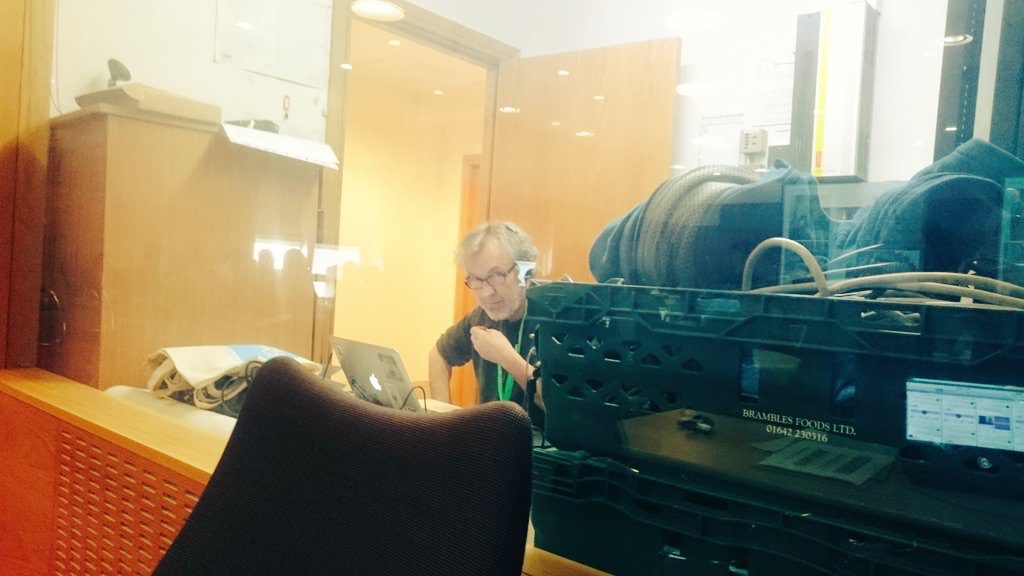
Meetings and greetings
It was a privilege to met and chat to folk who I had met before and those I knew only online. Even though I spent a fair bit of time in the booth I managed to catch up with far to many folk to mention.
OER Messages
I’ve not got a wide ranging knowledge of the OER world, but it was pretty obvious there are different interpretations of open, many speakers alluded to that. The First Keynote Catherine Cronin spoke about the social justice aspects.
Melissa Highton @honeybhighton talked about these different kinds of open, saying it doesn’t matter which one you choose as much as that you know the affordances and limitations of each (my interpretation).
There was a general feeling that the more open a resource the more sustainable it is. The more clauses in a license the more likely it is that it could be unusable if the owner could not be connected.
Personal learning
For the keynotes I had a very good feed from the microphones in the room. There was a little hiss from the rack. Recoding conversations in the booth was a bit more problematic as the rack were giving off a fair rumble. Usually with hiss I’d move out of audacity and go to GarageBand, this time I stayed in Audacity and used the equaliser. For the rumble I did manage to improve the audio a little with a combination of the equaliser and noise reduction effects.
The audio is not great but I’ve been happily listening to the results while commuting. It is surprising what you miss when you are broadcasting a second listen has been valuable to me. I do hope that the content of the presentations and conversations are widely listened to they messages are worth thinking about.. You can find the audio at #OER16 AUDIO
It was delightful to spend time with people who are gathered, not because they want to sell something, but with a shared idea that is aimed at doing good in the world. It was a privilege to do so, I owe thanks to the conference for giving me the opportunity. I am particularly aware that my position over the last few years has allowed me to take holidays to be able to attend events like this during term time, an opportunity not many class teachers have and one I’ll miss next session.
Image credits: Featured image, Jim Groom Keynote where he mentioned Edutalk, my own from the booth at the back.. Me with folk, lifted from twitter.

